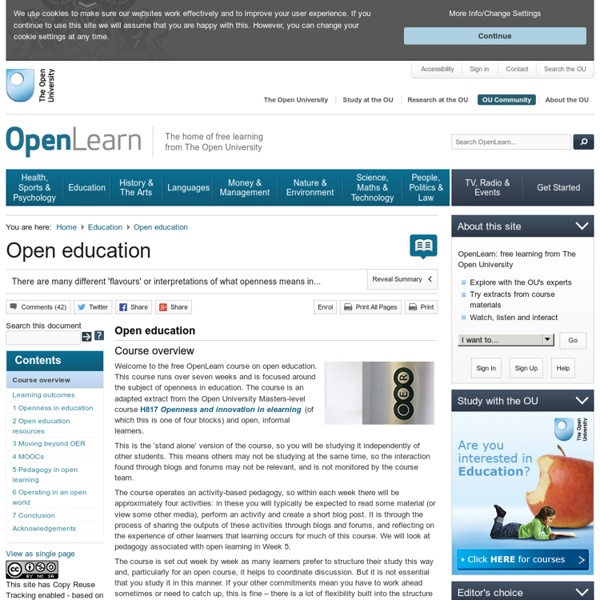The 35 Best Web 2.0 Classroom Tools Chosen By You
If you’re not an avid follower of #edchat on Twitter, you may be missing out on a great opportunity to learn about some new Web 2.0 tools that are currently being used in classrooms around the world. That’s because @chickensaltash posed a simple question to the PLN and there has been a huge swell of support as hundreds of people have jumped in to answer the question about which 5 Web 2.0 tools teachers are using in classrooms. The Best of the Best You can view the live stream of #edchat here and see what people are saying at the hashtag #chickenweb2tools here. We scoured hundreds of responses and have come up with the following list. The following tools have not been verified and are simply based on the number of times each was mentioned on Twitter during this hashtag discussion. Made at Tagxedo – it’s in this list! The List Added in the comments and via Twitter: Add To This List Have another recommendation?
Homepage - Cloudworks
Group work advice for MOOC providers
The most valuable aspect of MOOCs is that the large number of learners enables the formation of sub-networks based on interested, geography, language, or some other attribute that draws individuals together. With 20 students in a class, limited options exist for forming sub-networks. When you have 5,000 students, new configurations are possible. The “new pedagogical models” (A Silicon Valley term meaning: we didn’t read the literature and still don’t realize that these findings are two, three, or more decades old) being discovered by MOOC providers supports what most academics and experienced teachers know about learning: it’s a social, active, and participatory process. The current MOOC providers have adopted a regressive pedagogy: small scale learning chunks reminiscent of the the heady days of cognitivism and military training. Ah, the 1960′s. The large MOOCs can improve the quality of learning by creating a model for rapid creation/dissolution of groups.
Modern Lessons
Welcome to the new online learning platform for the Global Education Database! It’s a free, simple, and quick way to learn new skills, find new education resources, and figure out how to do just about anything a modern teacher or student needs. Take as many courses as you like – they’re free and all you need to do is sign up to get started. Register To Start Learning Free View More Courses
Beautiful web-based timeline software
72% Of Professors Who Teach Online Courses Don’t Think Their Students Deserve Credit
An error occurred with this part of the page, sorry for the inconvenience. This is not a good sign for online education: 72 percent of professors who have taught Massive Open Online Courses (MOOCs) Netflix requests the help of cloud gaming specialists in its recent job listing posts, a possible hint at what’s to come for its ongoing gaming venture. As noted by Protocol, the company is o... “You want to get your $7,500, then build this industry.” Apple is introducing a handful of new ways to support U.S. EV acceleration hit a new and interesting phase at the Monterey Car Week event that wrapped Sunday. Elon Musk’s legal team has subpoenaed former Twitter CEO Jack Dorsey, marking the latest development in the legal battle over Musk’s attempt to break his $44 billion acquisition agreeme... New Carta data is a mishmash of sorts, with the numbers not pointing cleanly in one direction. Disney+ revealed that “Thor: Love and Thunder” will be coming to the streaming service on September 8.
The Digital Learning Challenge: Obstacles to Educational Uses of Content in the Digital Age A Foundational White Paper
The Digital Learning Challenge: Obstacles to Educational Uses of Copyrighted Material in the Digital Age A Foundational White Paper This foundational white paper reports on a year-long study by the Berkman Center for Internet and Society, funded by a grant from the Andrew W. Mellon Foundation, examining the relationship between copyright law and education. In particular, we wanted to explore whether innovative educational uses of digital technology were hampered by the restrictions of copyright. The paper builds on four detailed case studies of initiatives that have encountered such obstacles. Drawing on these case studies, other research, and comments made by a cross-section of scholars, lawyers, librarians, and educators who participated in two day-long workshops organized as part of the project, the following emerged as the most significant copyright-related obstacles to educational uses of content: Back to Table of Contents 1. The remainder of this white paper undertakes the analysis.
Carmel Creek
Online education advocates look to make their message viral
The case for online education is often made like many other cases in higher education: in dense research papers with plenty of caveats. To wit, perhaps the most-cited document by advocates of online learning is a 2009 meta-study by the U.S. Education Department, which concluded that online education is probably at least as good as the face-to-face kind. That study has not appeared to have much pull with skeptical academic leaders and faculty. Now four lecturers at the University of Edinburgh are trying a different advocacy tack -- one more suited to the viral culture of the modern Web. The Edinburgh lecturers, who teach in an e-learning master’s degree program at the university, have written a “Manifesto for Teaching Online” that looks less like a traditional academic paper than an exceptionally wordy bumper sticker. The lead authors of the manifesto say these statements are not simple slogans but faithful abridgments of scientific research into online learning, often their own.
www.nmc.org/pdf/2010-Horizon-Report.pdf



